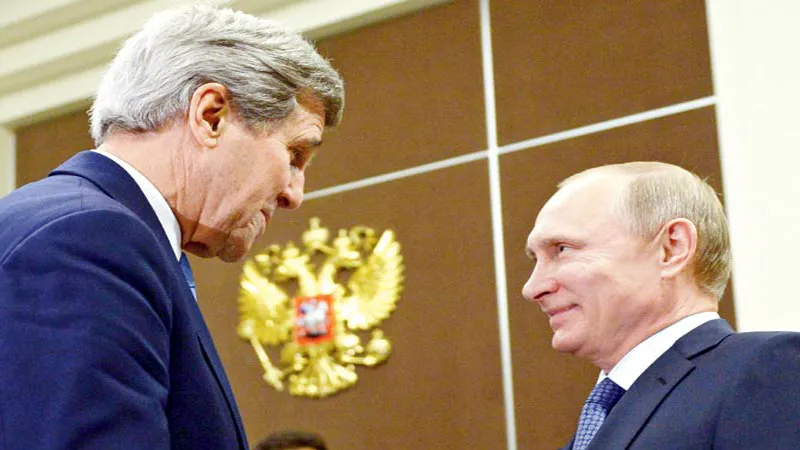-
CENTRES
Progammes & Centres
Location
Syria and Iraq are no longer just a do-and-kill struggle being enacted by extreme radical Islamists in their brutal search for a Caliphate. The Big Boys - US and Russia -- are now out in the open, the gloves are off and mind games are now being played.

Syria and Iraq are no longer just a do-and-kill struggle being enacted by extreme radical Islamists in their brutal search for a Caliphate. The Big Boys - US and Russia -- are now out in the open, the gloves are off and mind games are now being played where each blames the other for the escalation of the conflict.
Here in India, we usually get to hear the US and western version of the crisis. The Russian version is often muffled. Team America has Britain, France, Turkey, Saudi Arabia, Qatar and Israel. The Russian team has China and Iran backing Syria. There are other interests at play too - mega-corporations dealing with energy - of oil and gas and their mega-profits are aligned with strategic interests of global powers.
What was intended to be part of a glorious Arab Spring in Syria has turned out to be a quagmire for the powers involved and an unending nightmare for the people of Syria and Iraq. Assad had seen what had happened to Gaddafi in Libya and how General Sisi had handled the situation in Egypt. He learnt from both examples and decided to stand and fight.
The result of this was a quagmire where conflicting national, regional and global interests have become entwined with sectarian, religious and ideological interests. In all this, President Putin is no longer a potential partner of the West but a potential threat amidst anticipation of likely Russian aggression in the region. The Russians favour united international action against ISIS in Syria, accompanied by regional and international pressure on these armed groups to look for a political solution and finally unified efforts to cut off funds to terrorists and to prevent them from entering Syria.
It is doubtful though that any adventurous steps will be possible from a US polity in election year with the situation in Afghanistan far from stable. There will, however, be considerable theatrics with the accompanying danger of these theatrics getting a life of their own and ending up in grim reality shows. Russian warships and a Chinese warship do have a presence at the east Mediterranean Syrian port of Tartus and enhanced Russian military presence in Latakia.
While the US and others like the French are likely to continue to carry out air strikes against ISIS in Syria, these are unlikely to defeat the terrorists or make their own countries any safer. Back in February 2012, Putin had been sharply critical of the US policy of "airstrike diplomacy". It is doubtful though that the US will attack Syria as America is simply not prepared to commit ground forces in the region. Besides this will invoke direct support to Syria by both Russia and Iran and possibly some tacit support from the Chinese. The Russians have had a stake in Syria for decades and this increased presence is to prevent a possible effort to deconstruct the country and eject Russians.
There have been some bizarre suggestions from former officials of the administration that America should cultivate Al Qaeda affiliates like Al Nusra in Syria in their battles against ISIS. At best this is a display of cynical pragmatism but is more likely the result of confusion and desperation. Yet, since this has evoked some response in Washington probably means that the so-called moderate opposition to Assad does not exist. Also, the scheme to funnel assistance through Saudi Arabia, Turkey and Qatar has not been successful. Further, the rebels trained in and by Americans have joined Al Nusra while others have handed over arms and ammunition to them. The majority of Syrians remain pro-Assad, while Assad is smarter. He has retained allies in Iran, Russia and China. This makes Iran vital for any solution in Syria, Iraq and Afghanistan.
It has been clear for some years now that the US can no longer act alone or only with some allies pursuing their own agenda. The message from the Russian move is clear. If there has to be victory against IS, it has to be in cooperation with the Russians along with the Iranians. Otherwise there could be confrontation. This maybe a bitter pill to swallow for a system used to having its own way in the region for decades but the choices are narrowing. One does not see a way out unless the regional countries supporting Assad are taken on board.
It can no longer be my way or the highway.
(The writer is an ADvisor to Observer Research Foundation and a former chief of Research and Analysis Wing)
Courtesy: www.mid-day.com
The views expressed above belong to the author(s). ORF research and analyses now available on Telegram! Click here to access our curated content — blogs, longforms and interviews.

Vikram Sood is Advisor at Observer Research Foundation. Mr. Sood is the former head of the Research and Analysis Wing (R&AW) — India’s foreign intelligence agency. ...
Read More +